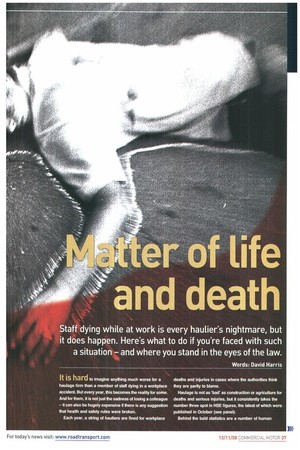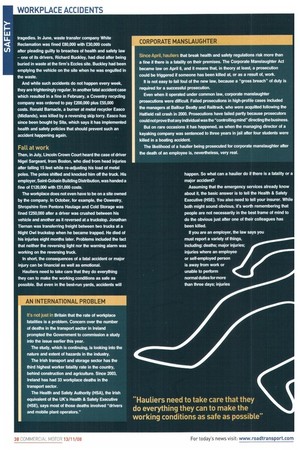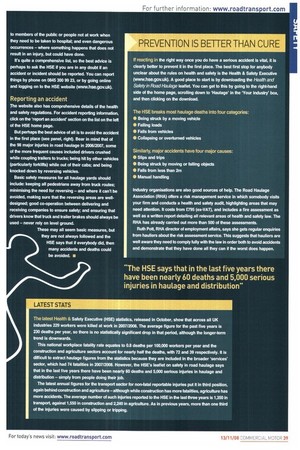Staff dying white at work is every haulier's nightmare, but
Page 37

Page 38

Page 39

If you've noticed an error in this article please click here to report it so we can fix it.
it does happen. Here's what to do if you're faced with such a situation and where you stand in the eyes of the Law.
Words: David Harris
It is hard to imagine anything much worse for a
haulage firm than a member of staff dying in a workplace accident. But every year, this becomes the reality for some. And for them, it is not just the sadness of losing a colleague — it can also be hugely expensive if there is any suggestion that health and safety rules were broken.
Each year, a string ol hauliers are fined for workplace deaths and injuries in cases where the authorities think they are partly to blame.
Haulage is not as 'bad as construction or agriculture tor deaths and serious injuries, but it consistently lakes the number three spot in HSE figures, the latest of which were published in October (see panel).
Behind the bald statistics are a number of human
1 WORKPLACE ACCIDENTS
tragedies. In June, waste transfer company White Reclamation was fined £80,000 with £30,000 costs after pleading guilty to breaches of health and safety law — one of its drivers, Richard Buckley, had died after being buried in waste at the firm's Eccles site. Buckley had been emptying the vehicle on the site when he was engulfed in the waste.
And while such accidents do not happen every week, they are frighteningly regular. In another fatal accident case which resulted in a fine in February, a Coventry recycling company was ordered to pay £200,000 plus £55,000 costs. Ronald Barnacle, a burner at metal recycler Easco (Midlands), was killed by a reversing skip lorry. Easco has since been bought by Sita, which says it has implemented health and safety policies that should prevent such an accident happening again.
Fall at work
Then, in July, Lincoln Crown Court heard the case of driver Nigel Sargeant, from Boston, who died from head injuries after falling 15 feet while re-adjusting his load of metal poles. The poles shifted and knocked him off the truck. His employer, Saint-Gobain Building Distribution, was handed a fine of £120,000 with £51,000 costs.
The workplace does not even have to be on a site owned by the company. In October, for example, the Oswestry: Shropshire firm Pentons Haulage and Cold Storage was fined £250,000 after a driver was crushed between his vehicle and another as it reversed at a truckstop. Jonathan Tiernan was transferring freight between two trucks at a Night Owl truckstop when he became trapped. He died of his injuries eight months later. Problems included the fact that neither the reversing light nor the warning alarm was working on the reversing truck.
In short, the consequences of a fatal accident or major injury can be financial as well as emotional.
Hauliers need to take care that they do everything they can to make the working conditions as safe as possible. But even in the best-run yards, accidents will happen. So what can a haulier do if there is a fatality or a major accident?
Assuming that the emergency services already know about it, the basic answer is to tell the Health & Safety Executive (HSE). You also need to tell your insurer. Whil both might sound obvious, it's worth remembering that people are not necessarily in the best frame of mind to do the obvious just after one of their colleagues has been killed.
If you are an employer, the law says you
must report a variety of things, including: deaths; major injuries; injuries where an employee or self-employed person is away from work or unable to perform normal duties for more than three days: injuries to members of the public or people not at work when they need to be taken to hospital; and even dangerous occurrences where something happens that does not result in an injury, but could have done.
It's quite a comprehensive list, so the best advice is perhaps to ask the HSE if you are in any doubt if an accident or incident should be reported. You can report things by phone on 0845 300 99 23, or by going online and logging on to the HSE website (www.hse.gov.uk).
Reporting an accident
The website also has comprehensive details of the health and safety regulations. For accident reporting information, click on the 'report an accident' section on the list on the left 01 the HSE home page.
But perhaps the best advice of all is to avoid the accident in the first place (see panel, right). Bear in mind that of the 98 major injuries in road haulage in 2006/2007, some of the more frequent causes included drivers crushed while coupling trailers to trucks; being hit by other vehicles (particularly forklifts) while out of their cabs; and being knocked down by reversing vehicles.
Basic safety measures for all haulage yards should include: keeping all pedestrians away from truck routes; minimising the need for reversing and where it can't be avoided, making sure that the reversing areas are welldesigned; good co-operation between delivering and receiving companies to ensure safety; and ensuring that drivers know that truck and trailer brakes should always be used never rely on level ground.
These may all seem basic measures, but they are not always followed and the HSE says that if everybody did, then many accidents and deaths could be avoided. 2












































































































































































